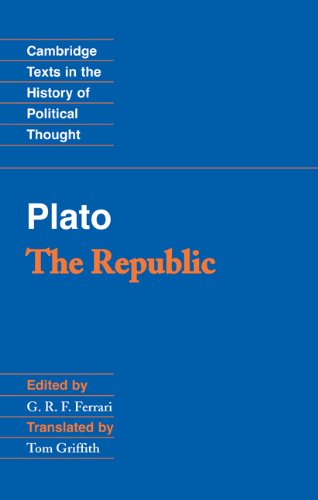Plato: The Republic (Cambridge Texts in the History of Political Thought) book download
Par ellis mary le jeudi, juillet 28 2016, 03:21 - Lien permanent
Plato: The Republic (Cambridge Texts in the History of Political Thought) by Plato, G. R. F. Ferrari, Tom Griffith


Download eBook
Plato: The Republic (Cambridge Texts in the History of Political Thought) Plato, G. R. F. Ferrari, Tom Griffith ebook
Publisher:
Page: 436
ISBN: 052148443X, 9780521484435
Format: pdf
15-27 posted by Rad Geek 04 Dec .. In sum: I disconnected myself from the world to devote all my attention to a question that has been haunting me ever since I have started reading Plato. The fragment of the Critias has given birth to a In English philosophy too, many affinities may be traced, not only in the works of the Cambridge Platonists, but in great original writers like Berkeley or Coleridge, to Plato and his ideas. Plato's writings have been published in several fashions; this has led to several conventions regarding the naming and referencing of Plato's texts. Neither must we forget that the Republic is but the third part of a still larger design which was to have included an ideal history of Athens, as well as a political and physical philosophy. Socrates is again the main character in the Republic, although this work is less a dialogue than a long discussion by Socrates of justice and what it means to the individual and the city-state. Their greatest innovation and delight, however, was the study of classical texts by the pagan authors whose focus on the secular world and elevation of the importance of mankind powerfully appealed to them. The most outstanding passages of this sort are, ironically, contained in the Timaeus , the dialogue whose dramatic date is the very day after the Republic .34 Here, the origins of the human race are recounted, in a manner very reminiscent of Hesiod. Who is the Hardly a minor figure: Danielle Allen (2010), Princeton, Cambridge background. Their idea of a liberal education, the studia humanitatis, continued to include grammar and rhetoric from the old curriculum, but added the study of a canon of classical authors writing poetry, history, treatises on politics, and moral philosophy. When I Yes, Plato was the world's first systematic political philosopher, using text to record technical philosophical advances, but he was also, it appears, the western world's first think-tank activist and its first message man. Starting from scratch, Socrates in Book II of Plato's The Republic attempts to visualise an ideal city in order to explore further the notion of political justice and where it fits within the boundaries of that city. Another development is Plato's increased awareness of temporality and history and their relations to politics and political theory. Susan Moller Okin on “Plato and the Greek Tradition of Misogyny,” from Women in Western Political Thought (1979, Princeton University Press).